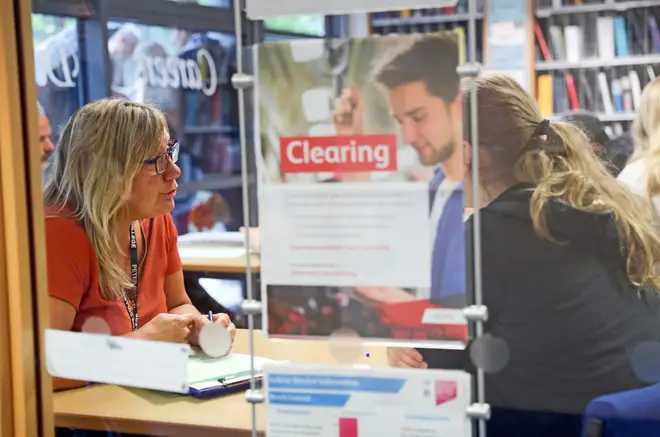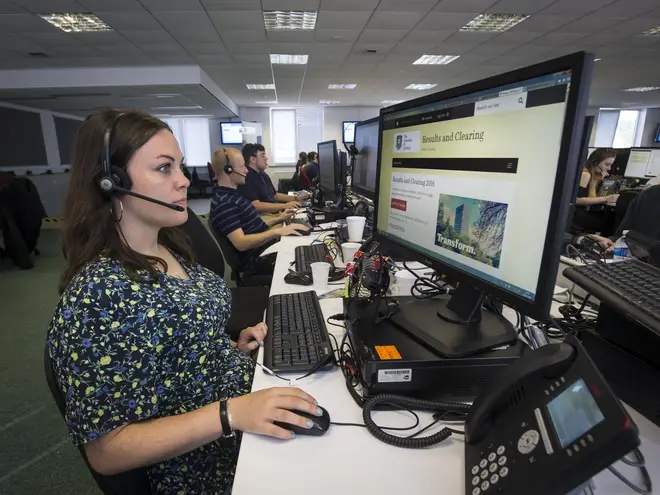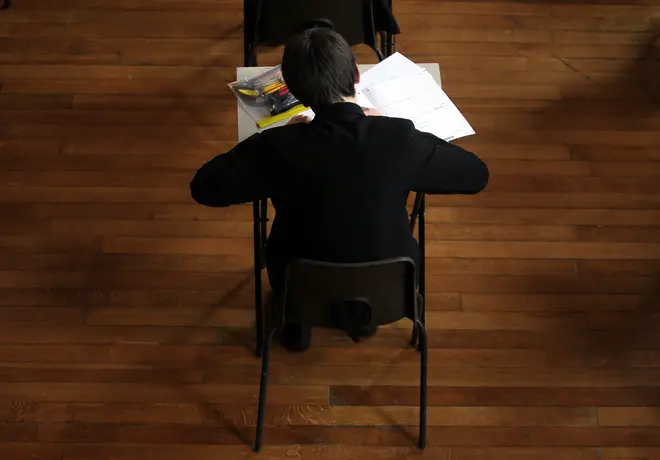
Boxing Day Special with Shelagh Fogarty 1pm - 3pm
11 August 2020, 17:44

Students are set to face the busiest ever university clearing process this year, with record numbers of pupils expected to take up degree places. But what are the best ways to avoid the scramble and secure a place?
With less than a week to go until pupils receive their A-level results, UCAS has said that 80,000 applicants could find a place via clearing, up from 73,325 last year.
The sharp rise in students applying to UK universities through clearing is now paving the way for the biggest-ever scramble for places, with experts warning that this year's A-level results day is set to become a “pressure cooker” day.
There could be fierce competition for places if English results mirror the downgraded results in Scottish highers, meaning students could fall short of their university offer conditions.
Here's how to get the best out of the process and secure a place...

The clearing process traditionally matches students who missed out of their chosen course to universities that still have places that are unfilled.
However, with exams cancelled in England and Scotland this summer as a result of Covid-19 and teachers instead being asked to supply predicted grades for university, the process has changed slightly.
Courteney Sheppard, Senior Customer Experience Manager at Ucas told LBC News: "Clearing is going to be different this year as students haven’t sat exams and have have much less control than previous years."
The clearing process is likely to be slightly tougher this year, with many school leavers from previous years who have had their gap years cut short expected to choose to bypass the main application scheme and instead opt for clearing to secure a place.
The number of students already registered to go through clearing up by 22 per cent this year from 2019.
However, Nick Hillman, director of the Higher Education Policy Institute, explained that students going through clearing are sill in a good position.
"It depends on where you’re trying to go of course, as some courses get full much more quickly this year and some just don’t go into clearing," he said.
"But if you’ve decided last minute, or you didn’t get a good offer, you’re at least as well placed, if not better this year, as clearing has been growing as a viable option for many people in recent years, with lots more courses and universities available.
"It’s now just a normal part of the university process, it's no longer a last resort for people who didn't get their grades.
"Universities do not hold all the cards, they also want to fill up their courses. Students should remember that they too can be a bit picky, not just the universities."

Ex-chief examiner suggests coronavirus exams strategy
But that doesn't mean that students this year will not face challenges with the process.
As Mark Corver, Founder of dataHE explained, English universities will for the first time since 2014 have hard limits on the amount of students they can accept.
In recent years, universities could accept students that they wanted, however this year the places are strictly limited.
Another challenge students are likely to face is a higher demand for places due to travel restrictions and the depressed job market.
Mark Corver explained that "more students who would have previously waited to go to university or chosen to enter straight into work are now seeing university as a better option due to Covid-19 factors."
Ucas also reported a late surge in applications before the end of the main admissions cycle on 30 June, suggesting that students are still keen to study instead of taking gap years or finding jobs.
A third challenge is likely to be the cancellation of exams and system of exam grades being awarded thorough predicted grades.
Mark explained that students should not just take their grades at face value, and said: "If A level grades are more than two or three adrift from what they were predicted by teachers in January then students should appeal.
Students can always ask universities to admit then based on their UCAS predicted grades, which were done by teachers in January, rather than their awarded grades."

There is a lot of homework students can do in advance to make sure they are as well prepared as possible before clearing.
The experts explained that there is a wealth of information available about courses, universities, spaces and more available at student's fingertips to take advantage of before the process even starts.
Nick Hillman explained: "Students who have already decided what course they want to undertake can do so much more research beforehand about the university and especially accommodation, this year especially with socialising at universities expected to be limited."
Courtney Sheppard from Ucas said: One of the big challenges his year is that most universities are remote, as well as UCAS working remote as well.
It means communication will be harder than ever for students and universities, however Courtney said Ucas have been doing a lot of preparation to mitigate this and communicate with students in the lead up, including Facebook live sessions with senior decision makers and university leaders.

Professor Lee Elliot Major proposes a national tutoring service for disadvantaged children at the Education Committee
Courtney Sheppard said clearing plus is crucial as student choice is more important than ever, and when students are in clearing and see 35,000 courses in front of them, it can be very daunting.
Ucas is this year using data from historic applicants and previously achieved qualifications from students and university requirements to recommend courses to students.
"They can express an interest straight away and the university see their application and call them back if they are interested.
"It means students can speed up the process and see courses they might not have ever considered before.
Nick Hillman said that although it is "untried and untested" it could help young people with making a "huge decision".
However, he emphasised that it is only courses that might fit well, and are in no way a prefect guarantee.
"Clearing plus is advice and guidance that can help, but first and foremost you should listen to yourself and what you want to do, not a computer," he explained.
Mark Corver supported this advice, saying: "Students should use lots of different routes to research your options and not put all their eggs in one basket.
"It's a good idea to use the service, but also use other resources such as university websites and teachers."

Teacher tells James O'Brien how impossible getting everyone back to school will be
Nick Hillman said his best advice is to "follow your head and your heart".
He said: "Clearing is always a scramble, but this can be the most important decision to date for many.
"People are always nervous, but the universities do not hold all the cards, they want to fill up their courses, so be choosy.
"Follow your head and find a course that is good but also follow your heart and don’t sign up for a course you don’t want to do or won’t be happy on.
Mark Corver said: "Clearing is about getting the balance right between not being hasty but also not leaving it too long and missing out.
"Also don’t be too restrictive in your options, open your mind to other subjects and universities than those you first had in mind.
And do not be frightened to call the universities and go for it - they are there to help!"